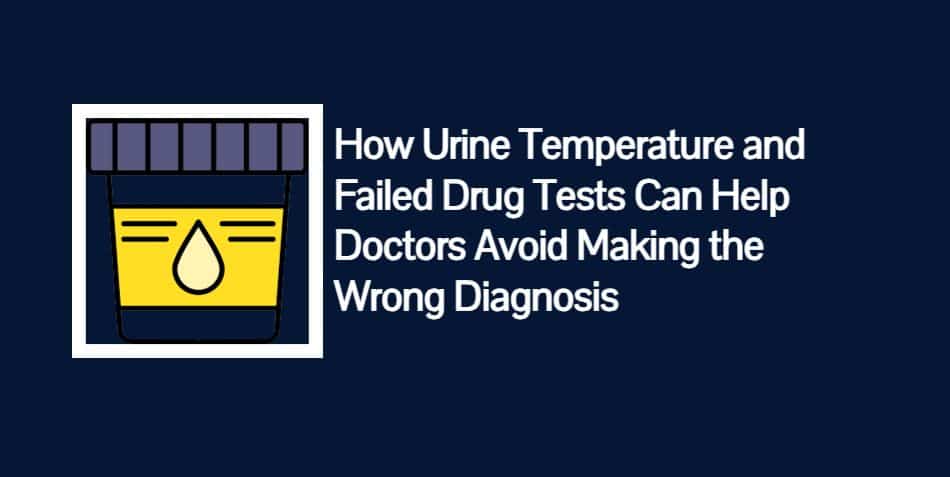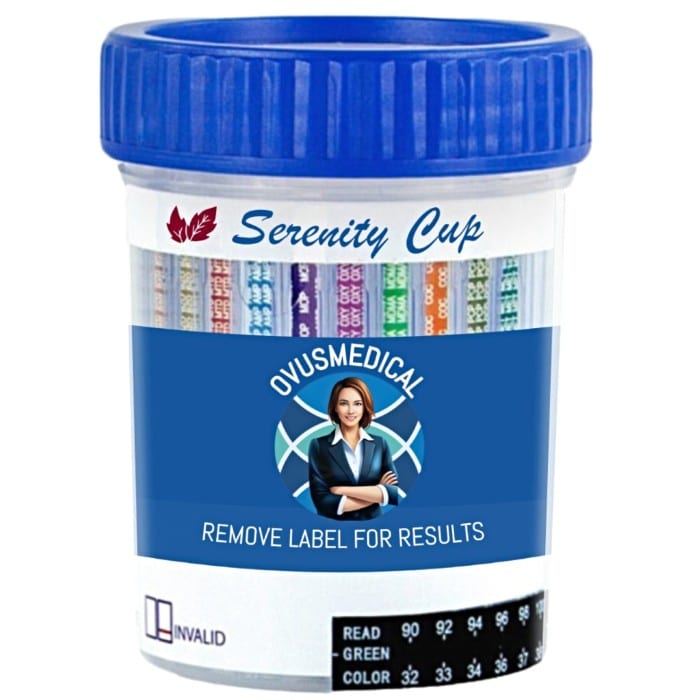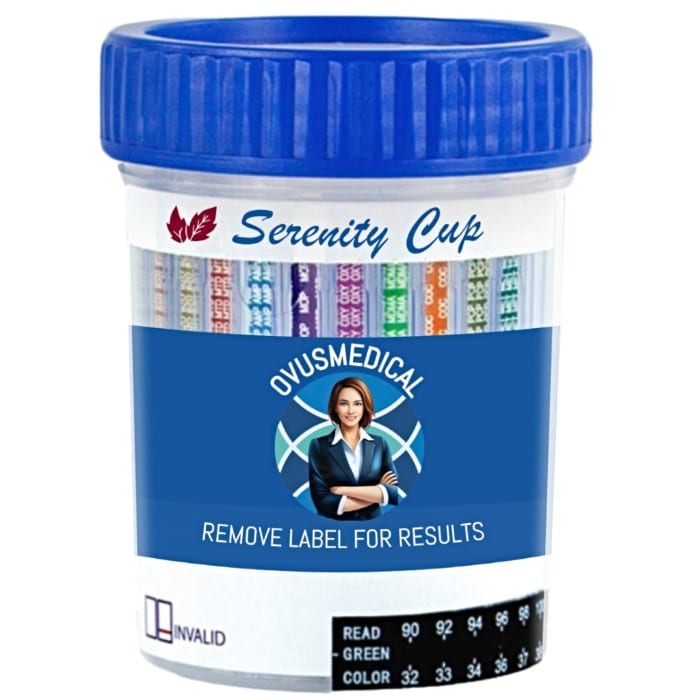Urine Temperature and Failed Drug Tests – What You Need to Know
Did you know that urine temperature and failed drug tests are a big part of how accurate drug tests are for doctors? Avoiding wrong diagnoses is very important in the high-stakes world of healthcare. Misinterpreting drug test results can be very bad, putting a doctor’s image at risk and possibly putting patient care at risk.
Because of this, it is very important to understand the connection between urine temperature and failing a drug test. For drug tests to be accurate, the pee sample needs to be within a certain temperature range when it is taken.
If you go outside of this range, you might get false-positive or false-negative readings, which could lead to the wrong diagnosis. The time between collecting the sample and checking it, how it was stored, and the method used for testing can all affect the temperature of the urine.
Healthcare centers can reduce the chance of making the wrong diagnosis by making sure doctors know how important urine temperature is in drug tests. This includes using the right methods to collect samples, keeping an eye on the temperature during transport and storage, and making sure the testing methods are correct.
In the end, knowing about this important link can help doctors make drug tests more accurate, which will lead to better care for their patients. Let’s look into the link between the temperature of a doctor’s pee and failed drug tests in more detail.
How drug testing works in the medical field
Testing for drugs is an important part of keeping the medical field safe and honest. Because doctors are in charge of taking care of people, they have to take drug tests to make sure they are not impaired while they are working.
Patients are safe, and the healthcare system keeps its reputation and trustworthiness in good shape. As part of a drug test, urine samples are usually taken and checked to see if certain chemicals are present.
It is very important that these tests are accurate because the wrong diagnosis can have very bad effects. Doctors can take steps to reduce the chance of getting fake results and make sure the process is fair by learning about the details of drug testing.
How important is it for drug test reports to be correct?
To keep the trust of patients, coworkers, and the healthcare system as a whole, it’s important to get accurate drug test results. If a doctor fails a drug test, it can hurt their professional image, cause them to lose their license, or even get them in trouble with the law. Incorrect drug test results can also lead to wrong diagnoses, which can compromise patient care and safety.
To protect both patient safety and the legitimacy of the medical field, it is important to make sure that drug tests give accurate results. Doctors who abuse drugs are more likely to make mistakes in their decisions and care for their patients. By using accurate testing to find out if someone is using drugs, healthcare centers can step in and help doctors beat their addiction while keeping patients safe.
Urine Temperature and Failed Drug Tests
During drug tests, the temperature of the urine can change for a number of reasons, which could lead to wrong results. To set up procedures that reduce the risk of a wrong diagnosis, it is important to understand these factors. Here are some of the most important things to think about:
- Time between taking samples and testing them: Temperature changes are more likely to happen if there is more time between taking samples and checking them. To get the correct results, it is important to process urine samples quickly.
- Conditions for storage: Urine temperature can be affected by bad storage conditions, like leaving it out in high temperatures or not keeping an eye on it enough. Facilities that provide medical care should have clear rules about how to store and move pee samples.
- Way of testing: Different ways of checking for drugs may need different temperatures. For instance, some testing methods might require the sample to be at body temperature, while others might have a certain temperature range. For correct results, it’s important to know what the chosen testing method needs.
Misconceptions about drug tests and pee temperature
Many people have the wrong idea about how the temperature of their urine affects the accuracy of a drug test. These false ideas can cause misunderstandings and even the wrong diagnosis. These myths need to be busted so that doctors and healthcare facilities have the correct knowledge. Here are some false beliefs that need to be cleared up:
- Myth: The temperature of your urine doesn’t change the results of a drug test. This is not true. If the temperature is not within the required range, it could lead to false-positive or false-negative readings, which could lead to the wrong diagnosis.
- Myth: Adding heat from outside can change the temperature of a pee sample. External heat can briefly change the temperature of urine, but it is more important to make sure the sample is in the right range when it is collected than to try to change it later.
- Myth: Small changes in the temperature of pee samples don’t affect the accuracy of drug tests. Even small changes in temperature can have a big effect on how accurate a drug test is. It is very important to keep a close eye on the temperature during the testing process.

How the temperature of your pee affects how well you do on a drug test
It is well known that the temperature of the urine affects how well a drug test works. For exact results, the temperature of the urine sample should be within a certain range when it is taken. If you go outside of this range, you might get false-positive or false-negative readings, which could lead to the wrong diagnosis.
The temperature of the urine is important for drug tests because it can show if the sample is real or not. If the temperature is too low or too high, it could mean that the product has been tampered with or adulterated. On the other hand, if the temperature is too high, it could mean that synthetic pee was used instead.
To get accurate drug test results, healthcare facilities must follow strict rules for getting, storing, and transporting pee samples. This means using containers that can keep the temperature stable, checking the temperature often, and following the testing guidelines given by the right regulatory bodies.
Advice for doctors on how to get an exact reading of the urine temperature during drug tests
There are a few things doctors can do to make sure that the temperature of the urine used for drug tests is correct. By following these tips, doctors can keep the drug testing process honest and reduce the chance of making the wrong diagnosis:
- Follow the steps for collecting samples: Learn the right way to collect samples as recommended by the appropriate regulatory groups. Carefully follow these instructions to get the correct results.
- Use items that can keep the sample at the right temperature. You should buy pee collection containers that can keep the sample within the right temperature range from the time it is collected.
- Keep an eye on the conditions of storage and transport. It is important to make sure that pee samples are kept and moved at the right temperature. Check the temperature often so that you can notice any changes right away.
- Get in touch with the testing lab: Make sure you can clearly communicate with the testing lab to find out what temperature requirements they have for pee. This will help you make sure the samples meet the requirements for the correct tests.
How to handle a failed drug test because of a difference in temperature
It is very important to know what to do if a doctor’s drug test fails because of differences in temperature. The steps below can help you get through this tough situation:
- Look into what caused it. Find out what caused the difference in temperature. Was there a mistake in getting the sample, storing it, or transporting it? Figuring out what caused the problem will help keep it from happening again.
- Get advice from the testing lab: Talking to the testing lab about the failed drug test and learning about their specific rules is important. They might give you advice on what to do next or give you more testing choices.
- Follow the rules of the facility: Follow the rules and guidelines set by your healthcare center for dealing with failed drug tests. This could include punishments, therapy, or programs to help people get better.
- Get support. If drug abuse is a factor, get the right kind of care and treatment. Use the tools that are available through professional healthcare organizations or programs that help employees.
Help and resources for doctors and medical centers
There are many tools and resources that doctors and medical organizations can use to make sure that drug test results are correct. Here are some of them:
- Rules and regulations: Learn about the rules that important regulatory bodies have set out for drug testing. These rules give useful information about how to properly collect samples, store them, and test them.
- Temperature monitoring devices: Buy reliable temperature tracking devices to keep track of the correct temperature of urine samples while they are being stored and shipped.
- Getting advice from experts: Talk to people who know a lot about drug testing to make sure you have the information and tools you need to set up effective protocols.
- Employee assistance programs: Use employee assistance programs to help doctors who are having problems with substance abuse by giving them support and tools. These programs can help with counseling, getting better, and getting ongoing assistance.
Conclusion
It is very important for doctors and healthcare organizations to understand the link between urine temperature and failed drug tests. Understanding the effects of temperature changes, adhering to strict guidelines, and utilizing the tools at hand can all lead to accurate drug test.
FAQs
1. Why is urine temperature so important for accurate drug testing results?
Learn how temperature can affect the accuracy of drug test outcomes and why it’s crucial for doctors and healthcare providers to monitor it.
2. Can urine temperature changes cause false-positive or false-negative results?
Find out how small fluctuations in urine temperature can lead to incorrect drug test results and what that means for diagnosis.
3. What happens if a doctor fails a drug test due to urine temperature issues?
Understand the consequences of a failed drug test caused by temperature irregularities and how to address the situation.
4. How can I ensure the urine sample stays at the correct temperature during transport?
Get practical tips on maintaining urine sample temperature during transport to avoid test inaccuracies.
5. What are the common misconceptions about urine temperature in drug tests?
Bust the myths around urine temperature’s impact on drug test accuracy and get the facts straight.
6. How can healthcare facilities avoid temperature-related drug test failures?
Discover best practices for storing and handling urine samples to prevent temperature changes that could impact drug test results.
7. What should I do if my urine sample’s temperature is outside the required range?
Learn the steps to take if the urine sample’s temperature is off, including how to rectify it and communicate with testing labs.
8. Why is it important for doctors to learn about drug test protocols?
Explore how doctors can ensure accurate drug testing by following proper collection, storage, and testing procedures.
9. What role do temperature monitoring devices play in ensuring accurate drug tests?
Find out how investing in reliable temperature tracking devices can help healthcare providers maintain the accuracy of drug test results.
10. How can drug abuse impact a doctor’s drug test results and what should be done about it?
Understand the potential for drug abuse to influence test results and the resources available to doctors for getting help and treatment.
You may also like…
-
16 Panel Drug Test ETG & TRA, FYL
As Low As $2.89
Forensic Use Only
$3.69 Info & Price This product has multiple variants. The options may be chosen on the product page -
14 Panel Drug Test Cup PCP
As Low As $2.79
Forensic Use Only
$3.59 Info & Price This product has multiple variants. The options may be chosen on the product page -
13 Panel Drug Test w/ FYL
As Low As $2.39
Forensic Use Only
$3.19 Info & Price This product has multiple variants. The options may be chosen on the product page




